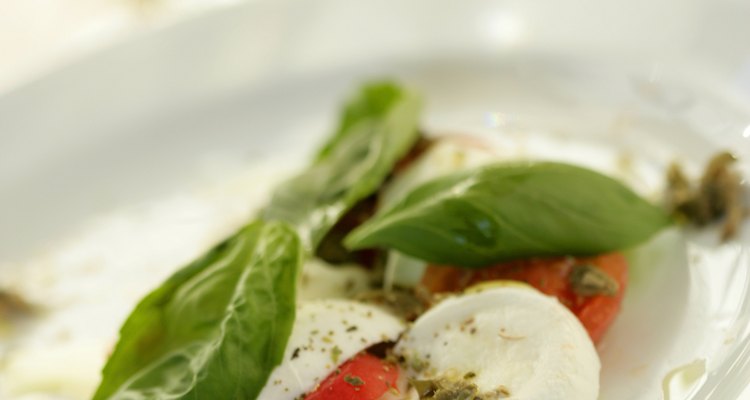
Goodshoot/Goodshoot/Getty Images
With a bit of time and patience, you can make certain types of cheese at home. Mozzarella cheese requires a bit more effort than a cheese such as ricotta, as you need to knead the curds in the whey to give the cheese its distinctive texture. There's a lot that can go wrong when making mozzarella, so it's important to start with the right ingredients. Almost any type of milk will work, but some types will give you better results than others.
Pasteurized Milk Is Okay
Typically, the milk you buy at the store is pasteurized, meaning that it has been heated to at least 145 degrees Fahrenheit for 30 to 35 minutes. Pasteurization kills bacteria in the milk and changes its chemical make-up slightly. You can use pasteurized milk to produce mozzarella, but you might have to add a very small amount of calcium chloride to it first, according to Dr. David B. Fankhauser, a biologist at the University of Cincinnati Clermount College. Calcium acts as a coagulant and will help the mozzarella set up.
Raw Milk Also Works
If you live in a state where you can legally buy raw milk, you can use it to make your own mozzarella, but be aware of the risks involved. Raw milk might produce a better cheese, since you don't have to add calcium chloride to it to help the cheese thicken. It's illegal to sell raw milk for human use in 17 states, as the milk can be contaminated with bacteria such as Listeria, which causes food poisoning and can be fatal. FoodSafety.gov doesn't recommend that anyone drink or use raw milk.
Skip Ultra Pasteurized
One type of milk to avoid using when making cheese is ultra-pasteurized. Ultra pasteurized milk is heated to a minimum of 162 F for 15 seconds. Although it's only held at a high temperature for a short time, the high heat is enough to cause a change in the taste of the milk and to denature 10 percent of the whey proteins. The over-heated milk won't coagulate when you try to make mozzarella. If you aren't sure whether the milk you purchased is pasteurized or ultra pasteurized, you can call the dairy to ask. A call to the milk producer is often the only way to find out, according to Kelly Price of "America's Test Kitchen Feed."
Remember Fat Content
What might matter more than whether your milk is raw or pasteurized is the amount of fat in the milk. You can technically make mozzarella from any type of milk, from whole to skim. Typically, the higher the fat content of the milk, the more rich and full the finished cheese will be. You can use skim milk but the cheese might taste thin and watery. Kelly Price recommends adding a bit of pasteurized heavy cream to the milk you use to increase the richness of the cheese.
Related Articles

How to Tell if Mozzarella Is Bad

Cheeses Similar to Feta
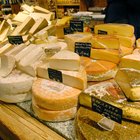
What Type of Microorganism Is Used to ...
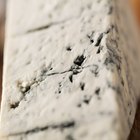
What Good Bacteria Is in Cheese?
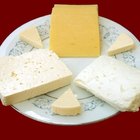
What Makes a Cheese Mild, Medium or ...

How Can I Tell If Ricotta Cheese Has ...

How to Cook Elbow Macaroni in Milk
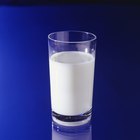
How to Freeze Goat's Milk

Feta Cheese Nutrition
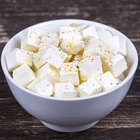
How Much Fat Is in Feta Cheese?

Substitute for Curd
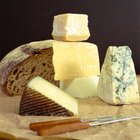
Which Cheeses Contain Animal Rennet?
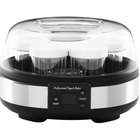
How to Mix Yogurt With Unflavored ...
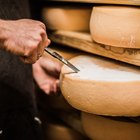
How to Make Muenster Cheese

How Long Can You Refrigerate Nacho ...
Can I Eat My Cheddar Cheese Past the ...
The Difference Between ...
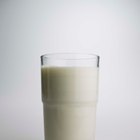
How to Cook With Lactaid

How to Defrost Frozen Mozzarella
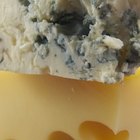
How to Freeze Cheeses
References
- On Food and Cooking: Harold McGee
- Farm to Consumer: State-by-State Review of Raw Milk Laws
Writer Bio
Based in Pennsylvania, Emily Weller has been writing professionally since 2007, when she began writing theater reviews Off-Off Broadway productions. Since then, she has written for TheNest, ModernMom and Rhode Island Home and Design magazine, among others. Weller attended CUNY/Brooklyn college and Temple University.
Photo Credits
Goodshoot/Goodshoot/Getty Images